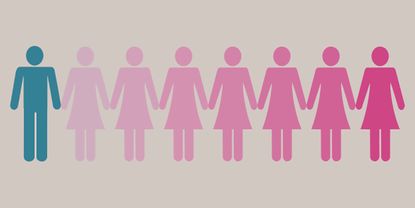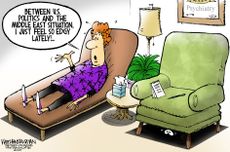What polyamory can teach us about the economics of family life
When you have economic stability and affluence, you’re freer to take risks — whether it’s pledging yourself to one person for life, or doing something more outre.


Polyamory seems to be having a moment, thanks in large part to the looser sexual mores of the millennial generation. But Kaitlyn Mitchell at Mic.com recently dinged the trend for largely being the province of well-off white people.
The funny thing is, stable traditional marriages in recent decades have also become a hallmark of the well-off. While we tend to think of marriage and polyamory as diametric opposites, the ability to engage in either form of relationship is a privilege — one that requires economic stability and a certain amount of affluence to access.
Part of the problem Mitchell identifies is clearly about race: there's the overwhelming whiteness of polyamorist communities, the relative discomfort and “othering” non-white people face, and the tendency to exoticize or fetishize non-white women especially. But a big part of it is also about class: multiple studies show big majorities of polyamorists — at least two-thirds and often more — are employed in professional jobs and have at least a bachelor’s degree.
Subscribe to The Week
Escape your echo chamber. Get the facts behind the news, plus analysis from multiple perspectives.

Sign up for The Week's Free Newsletters
From our morning news briefing to a weekly Good News Newsletter, get the best of The Week delivered directly to your inbox.
From our morning news briefing to a weekly Good News Newsletter, get the best of The Week delivered directly to your inbox.
Buying tickets to events, throwing parties, or purchasing fetish wear — these aren't absolute requirements for participation in polyamorist and kink communities, but the studies note they can be associated costs. And jobs for the lower classes don’t just pay poorly; they also often lack benefits, paid leave, and stable schedules. So people in those jobs have much less time or energy to devote to dates, to community events, and to nurturing multiple relationships. The lifestyle is also helped along by a certain amount of urban density and good public transit infrastructure — something, again, much more available to high earners in big cities. (It’s also worth noting that racial injustice and economic injustice overlap to a very large degree.)
The elitist tinge of many polyamory circles "disregards the costs of sexual health, pregnancy, money, and time that affect people without a built-in safety net," wrote Vivienne Chen, a journalist and sexuality activist, in 2014. "A polyamorous party can be starkly alienating for a working class, non-urban individual, especially if they’re also the only person of color in the room."
Ironically, almost the exact same type of class divide has opened up in good old-fashioned monogamous marriages. The collapse of marriage for the poor and working class over the last few decades — and the rise of divorce, single-parent homes, and general chaos in family structure — is well-documented at this point. But the marital class divide also occurs for roughly the same reasons as the polyamorist class divide.
Research by Naomi Cahn and June Carbone suggests that job insecurity makes marriage a far bigger risk for the lower classes; you’re committing for life to someone who’s much more likely to lose their job at a critical moment, to have less income over the long haul, to get arrested, etc. Lower-class men may show less life discipline, but there’s only so much you can expect from any human being when they're almost guaranteed to stay poor if they're born poor.
Similarly, researcher Kathryn Edin has pointed out that a lack of birth control doesn’t drive teenage pregnancy nearly as much as poverty and low social mobility. Young women in these circumstances rightly recognize that their chances of escaping their socioeconomic circumstances are low. Meanwhile, raising a child can be one of their few sources of stability and meaning. So what’s the point of hewing to the “sequence” of an education, a job, a marriage, and only then a pregnancy?
There’s plenty of evidence that getting and staying married comes with a ripple effect of benefits in terms of income and employment, especially for men. (Though polyamorous relationships might also give poor people an economic edge — like marriage, they are a form of social capital.) But while marriage can lift the prospects of the working class, the fact that they’re working class also makes marriage much harder to pull off in the first place. The vast majority of the people in the upper class didn’t start at the bottom. They pulled off stable marriages because they were born into the upper class’ socioeconomic safety net.
Some conservatives have pitched the idea that social liberalism is itself a form of class warfare, suckering the lower classes into social chaos while the upper class quietly enjoys stable traditional families. But this doesn’t account for the way that stable marriage and polyamory, libertinism and sexual caution, coexist in the upper class. Nor does it explain the fact that the poor as a whole voice less cultural tolerance for nontraditional relationships and lifestyles while also enjoying far less marital and family stability.
The culture war tends to obscure the fact that both traditional marriage and polyamory are value choices, and the freedom to live out either value is all about economic security.
Both marriage and polyamory require risk-taking — maybe not quite the same level or type of risk, but not as far from each other on the continuum as we might think. Meanwhile, remaining forever single — even while being a parent — is arguably the least-riskiest choice you can make. The only variable you have to deal with is you. But when you’re upper class, you have lots of sources of stability to rely on other than your relationships: well-paying jobs, good benefits, paid leave for sickness and children and family issues, healthy communities, functioning public services, good schools, high social capital, and more.
That frees you up to take more risks in your emotional life, whether it’s the risk of pledging yourself to one human being for life, or the risk of sleeping around, or whatever else floats your boat.
Create an account with the same email registered to your subscription to unlock access.
Sign up for Today's Best Articles in your inbox
A free daily email with the biggest news stories of the day – and the best features from TheWeek.com
Jeff Spross was the economics and business correspondent at TheWeek.com. He was previously a reporter at ThinkProgress.
-
 'A direct, protracted war with Israel is not something Iran is equipped to fight'
'A direct, protracted war with Israel is not something Iran is equipped to fight'Instant Opinion Opinion, comment and editorials of the day
By Harold Maass, The Week US Published
-
 Today's political cartoons - April 17, 2024
Today's political cartoons - April 17, 2024Cartoons Wednesday's cartoons - political anxiety, jury sorting hat, and more
By The Week US Published
-
 Arid Gulf states hit with year's worth of rain
Arid Gulf states hit with year's worth of rainSpeed Read The historic flooding in Dubai is tied to climate change
By Peter Weber, The Week US Published